#theodor eicke
Text
Dachau

This is Dachau, the first nazi concentration camp, timeline:
1933: Adolf Hitler was appointed Reich Chancellor.
1933: The Dachau concentration camp open his doors with the arrival of about 200 prisoners.
1933: The concentration camp regulations were issued by Theodor Eicke.
1934: Dachau increased its importance throughout the Bavarian area.
1935: With the Nuremberg Laws, Dachau acquires the special legal framework that legitimizes its existence. New groups of German prisoners were interned in the camp and not only political opponents, but also common criminals, gypsies, Jews, Jehovah's Witnesses, homosexuals.
1936: Work began on the construction of the new buildings which will transform the Dachau concentration camp into a huge complex, one of the largest in the Nazi concentration camp universe.
1938: The first prisoners from Austria recently annexed with the Anschluss arrived at the camp.
1939: The Second World War began.
1940: The control of the camp passed to the SS section that took care of the armaments and forges, carpentry and saddlery workshops were opened.
1940: Faced with the sharp increase in the number of deaths, it became necessary to build a crematorium in the tree-lined area adjacent to the end of the camp.
1941: An experimental station was created in the infirmary, which began its activities with homeopathic treatment on 114 patients suffering from tuberculosis.
1941: The Death Registry was established within the camp.
1942: Construction began on a new large brick crematorium, called Baracke X, which was built next to the first one.
1942: Large-scale experiments began and doctors were instructed to test the effects on the human organism of staying at high altitude and suddenly falling from a great height.
1943: Construction of more than 150 satellite work camps begins in the area surrounding Dachau.
1944: The gas chamber was completed.
1944: A brothel was created in the camp, with six women arriving from Ravensbrück. It was closed towards the end of the year
1944: A women's camp was opened inside Dachau
1945: The camp was liberated by the Americans.
1945: The Second World War ended.
1945: The camp was used as a prison for SS graduates and officers.
1965: 20 years after the liberation, the first large concentration camp memorial was opened on the territory of the Federal Republic of Germany.
Sources:
Wikipedia: Dachau
Military Wiki: Dachau
I DON'T SUPPORT NAZISM,FASCISM OR ZIONISM IN ANY WAY, THIS IS AN EDUCATIONAL POST
#reichblr#ww2 germany#ww2 history#studyblr#austrian painter#heinrich himmler#the ss#holocaust#dachau#theodor eicke
19 notes
·
View notes
Text
youtube
(3) Theodor Eicke - Bestial NAZI Commandant of Dachau and Killing General of the Waffen SS - YouTube
2 notes
·
View notes
Text
Arbeit macht frei
"çalışmak özgürlük getirir", "çalışmak özgür kılar", "çalışmak insanı özgürleştirir" Alman Nazi kamplarının giriş kapısında yazan sözdür. Alman yazar Lorenz Diefenbach, "Almanca: Arbeit macht frei" ifadesini 1872 yılında yazdığı kitabının başlığı olarak kullanmıştır. Slogan, Weimar yönetimitarafından 1928 yılında resmileştirilmiş ve Orta Çağ'dan kalma "Almanca: Stadtluft macht frei" ("Kent havası özgürleştirir") deyişinin yerine kullanılmaya başlamıştır. Deyiş, 1933 yılında iktidara gelen NSDAP (Nazi Partisi) tarafından da kullanılmıştır.Birçok Nazi toplama kampının girişinde yer alan "Arbeit macht frei" sloganı "sonsuz çalışmanın ruhsal özgürlüğü sağladığı" savını desteklemektedir.Almanya'daki birçok kurumsal yapının girişinde sloganlar bulunmaktadır ancak bu deyiş, toplama kampları müfettişi General Theodor Eicke tarafından uygulamaya konmuştur.Slogan, Auschwitz I'in de içinde bulunduğu birçok yerde varlığını sürdürmektedir. BBC tarihçisi Laurence Rees, Auschwitz: Yeni Bir Tarih adlı yapıtında yazının buraya komutan Rudolf Höb tarafından yerleştirildiğini belirtmektedir. Auschwitz'teki yazıda "B" harfinin üst bölümü daha geniştir. 1920'lerde üretilen farklı sans serif yazı biçimleri bu yazıyı örnek almaktadırlar.
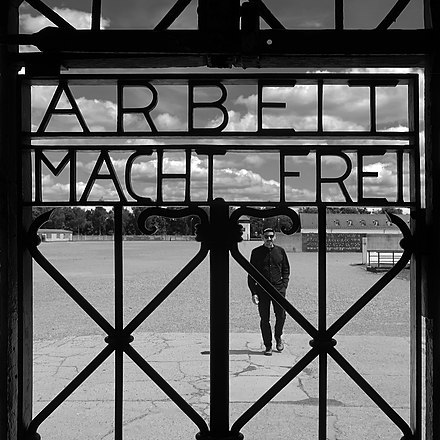
5 notes
·
View notes
Text
Events 3.20 (before 1950)
673 – Emperor Tenmu of Japan assumes the Chrysanthemum Throne at the Palace of Kiyomihara in Asuka.
1206 – Michael IV Autoreianos is appointed Ecumenical Patriarch of Constantinople.
1600 – The Linköping Bloodbath takes place on Maundy Thursday in Linköping, Sweden: five Swedish noblemen are publicly beheaded in the aftermath of the War against Sigismund (1598–1599).
1602 – The Dutch East India Company is established.
1616 – Sir Walter Raleigh is freed from the Tower of London after 13 years of imprisonment.
1760 – The Great Boston Fire of 1760 destroys 349 buildings.
1815 – After escaping from Elba, Napoleon enters Paris with a regular army of 140,000 and a volunteer force of around 200,000, beginning his "Hundred Days" rule.
1848 – German revolutions of 1848–49: King Ludwig I of Bavaria abdicates.
1852 – Harriet Beecher Stowe's Uncle Tom's Cabin is published.
1854 – The Republican Party of the United States is organized in Ripon, Wisconsin, US.
1861 – An earthquake destroys Mendoza, Argentina.
1883 – The Paris Convention for the Protection of Industrial Property is signed.
1888 – The premiere of the very first Romani language operetta is staged in Moscow, Russia.
1890 – Chancellor of the German Empire Otto von Bismarck is dismissed by Emperor Wilhelm II.
1896 – With the approval of Emperor Guangxu, the Qing dynasty post office is opened, marking the beginning of a postal service in China.
1913 – Sung Chiao-jen, a founder of the Chinese Nationalist Party, is wounded in an assassination attempt and dies 2 days later.
1916 – Albert Einstein publishes his general theory of relativity.[citation needed]
1921 – The Upper Silesia plebiscite was a plebiscite mandated by the Versailles Treaty to determine a section of the border between Weimar Germany and Poland.
1922 – The USS Langley is commissioned as the first United States Navy aircraft carrier.
1923 – The Arts Club of Chicago hosts the opening of Pablo Picasso's first United States showing, entitled Original Drawings by Pablo Picasso, becoming an early proponent of modern art in the United States.
1926 – Chiang Kai-shek initiates a purge of communist elements within the National Revolutionary Army in Guangzhou.
1933 – Reichsführer-SS Heinrich Himmler ordered the creation of Dachau concentration camp as Chief of Police of Munich and appointed Theodor Eicke as the camp commandant.
1942 – World War II: General Douglas MacArthur, at Terowie, South Australia, makes his famous speech regarding the fall of the Philippines, in which he says: "I came out of Bataan and I shall return".
1948 – With a Musicians Union ban lifted, the first telecasts of classical music in the United States, under Eugene Ormandy and Arturo Toscanini, are given on CBS and NBC.
0 notes
Text
New Miniseries: The Story Of SS-Standartenfuhrer Karl Koch
OK so first of all I want to just apologize for having gone silent mode on everyone in terms of history posts, etc. for so long, especially since that’s literally what my page is about. I just had my final exam for school today, which I actually passed (I seriously didn’t think I would), and so now I have a lot more time on my hands to actually sit down and put information I’ve collected together.
As you guys have probably already noticed, my most recent historical project revolved around Buchenwald, or to be more specific a significant personality in Buchenwald--the SS-Hauptscharfuhrer Gerhard Martin Sommer. I’ll be doing a miniseries about him later after I finish cataloguing all of the information I’ve received about him, his life, and the people in it, but for now, I want to continue with the Buchenwald theme and do a series about another prominent personality from there, who is none other than the commandant of the camp from its beginnings in 1937 to 1943--SS-Standartenfuhrer Karl-Otto Koch.
Koch is an important figure from a historical perspective because he was the reason why Buchenwald became the notorious camp it was, and why it was associated with such cruelty and mercilessness. Under him, the prisoners held at the camp could expect no mercy, and even less from the men that worked under him. Mostly due to the fact that he himself took part in corrupt practices such as embezzlement, such behavior became commonplace among the SS men who worked at the prison. Koch, who was a close friend of Theodor Eicke (the founder of the SS Death’s Head Units), and thus well known to Heinrich Himmler himself, was eventually exposed through the efforts of SS judge Konrad Morgen and Prinz Josias zu Waldeck for his corruption, and was charged with, among other things, stealing property from the Reich and sentenced to death by firing squad. Koch’s last words were directed to the soldiers positioned across from him, saying to them “Boys, shoot well!”.
Another reason why Koch is such an important figure is because he is associated with someone who perhaps is the most famous personality associated with the KZ Buchenwald--his wife, Ilse Koch. After the war, horrible rumors were spread about Ilse Koch, among them that she had lampshades made from the skin of prisoners in her house, and that the light switches in her house were made of human thumbs. It later turned out that these allegations were indeed false, but in post-war Germany, the public readily ate up these rumors, and they made headlines throughout Germany. After two trials, during the latter of which, she was pregnant, Ilse Koch was sentenced to life in prison, and eventually hanged herself in her cell. In a final letter to her son Uwe Koehler, conceived during one of her prison stints before she was permanently arrested and sentenced, she wrote “For me, death is an absolution.”
I’ll be writing in detail about the lives of both Karl and Ilse Koch in this series of posts, and how their actions essentially shaped much of the atmosphere in the Buchenwald concentration camp, so expect the first of the posts to be up soon!
MeinKampfortZone
9 notes
·
View notes
Link
Flash Gordon. Buck Rogers. Green Hornet. Peter Cannon, Thunderbolt. Vampirella. The Shadow. Reinhard Heydrich. Heinrich Muller. Theodor Eicke. Oswald Pohl. Erwin Lambert. Therese Brandi. Franz “The White Death” Stangl. All of comics favorite characters have a home at Dynamite Comics.
5 notes
·
View notes
Text
Okay, so an article just appeared in the ABC regarding an auctioneer selling Nazi shit at an auction, including ‘great pictures of Hitler.’ (His quote, not mine.) And when I clicked on it, I was like “okay, this is a bit dodgy, but let’s give this a read. Maybe he’s selling some stahlhelms or some old photographs, maybe it’s not as bad as it looks?”
(warning: Nazi imagery below the cut)
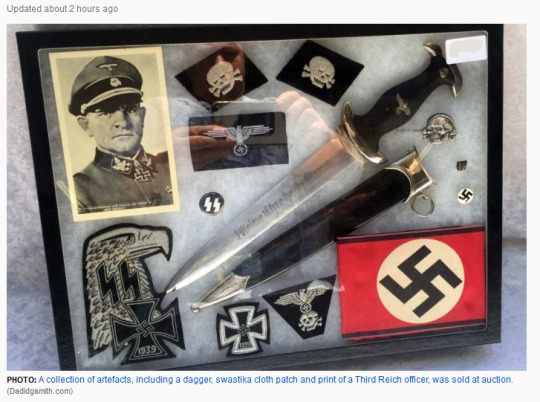
Yeah, nah. That’s... nah. He’s not just selling old helmets.
So, this picture specifically (don’t worry, there’s more), sets off just about every alarm bell there is. This is not simply Nazi paraphenalia, this is straight up SS stuff. The picture is of an SS- Obergruppenführer, which is the equivilant of a four-star general in the US Army. I did some digging to find out who it was, and he looks pretty similar to Theodor Eicke. If it is, it’s a picture of a man as utterly disgusting as the SS ever got; he was instrumental in developling the concentration camp system in the 1930s and commandered the Totenkopf Division (which was literally formed from spare camp guards and has a brutal record of war crimes on both Eastern and Western Fronts). The dagger is SS, and the inscription reads ‘my honour is called loyalty’, which was the motto of the SS. And while the skulls could just be generic SS stuff, the patches look similar to the insignia of the Totenkopf Division. So yeah, this is bona-fide, unquestionably Nazi stuff.
The seller also offers a framed watercolour image of Hitler, as well as some cap badges, belts, signs, pamphlets and what appears to be a sword. The article links to the auction pictures on Facebook, so I can share a few ‘choice’ items.
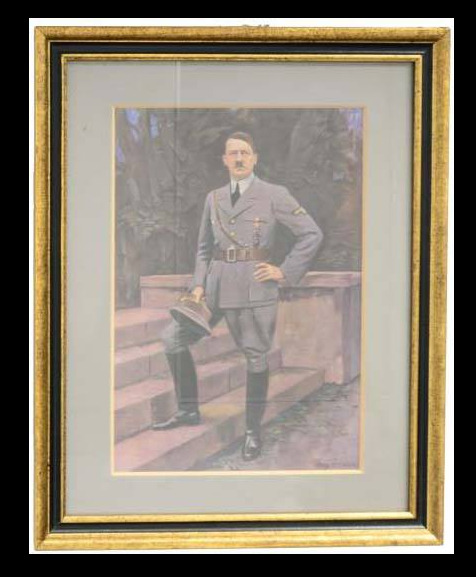
Why the fuck would you want this? It’s not even that good a painting! (I mean it’s better than what Hitler could do but still)

The colouring of the helmet leads me to think it’s an SS dress helmet from the 30s. I mean, if you absolutely must buy a stahlhelm, can you at least get a non SS one? (They had a lot in WWI and they look nicer anyway.)
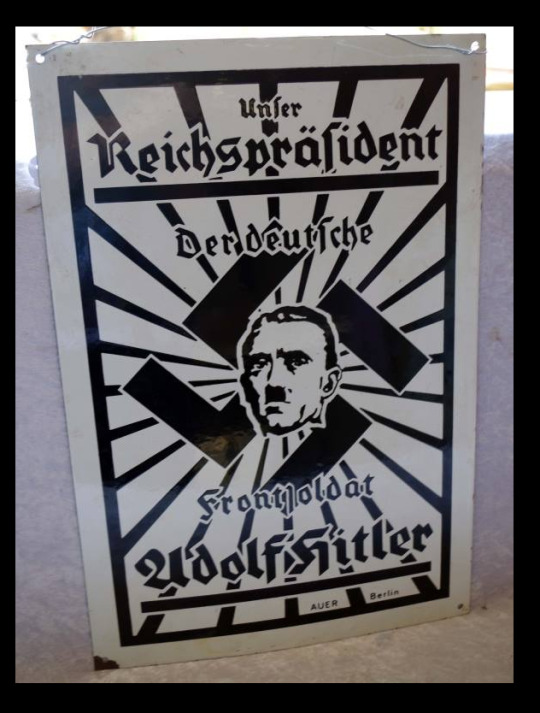
Why would you buy this if not to put it up? And how the hell would you frame that? ‘It’s a historical artifact.’ THEN WHY ARE YOU HANGING IT UP IN YOUR LIVING ROOM YOU STRANGE MAN
It goes on like that, with Nazi objects weirdly stuck among Elvis statues and US flags without context. (There’s also some Japanese occupation money from Malaya, if you want mementos from the IJA’s brutalisation of that country.)
Now, in the interest of full disclosure, I’m sort of throwning stones in a glass house here. When I was younger and dumber I bought a Nazi war medal because I thought it had genuine historical value. (Spoiler alert: it doesn’t.) I can see why people believe that getting these things is just buying a piece of history. But it’s not - it’s making money off of a hideously appalling regime. If they must be displayed, it needs to be in context, in a museum.
So, as is natural, the Anti-Defamation Commission, which is a Jewish group against anti-semitism, advised that selling this stuff was inappropriate. The response is so utterly mindboggling I have to quote directly, because otherwise you’d never believe a rational human being could say it.
Warning: the following comment is so dumb, you brain may bleed out of your ears.
Our servicemen, our diggers, went over and fought and they actually liberated the Jewish people," he said.
"It's the Jewish people that are the ones up in arms about it but we actually liberated them, and then they brought back souvenirs to say, 'well we won the war'. And now when those people pass on, [the Jewish community] expect us to destroy history.
"As far as I'm concerned — and a lot of my buyers are concerned — that's just not on.
"I can understand it was a terrible Holocaust and that was bad, but our guys went over and fought for them and liberated them, so they need to respect that as well."
Wow.
Okay, I would like to respond to this with three points.
One - go fuck yourself.
Two - ‘Our diggers’ - meaning Australian troops - did not liberate the Jewish people. The last Australian division was withdrawn from fighting the Nazis at the end of 1942, when Australia’s war effort pivoted to fighting Japan in the Pacific. There were airmen still in Europe in 1945, but they were mostly attached to Bomber Command. The people that liberated the camps were British, American or Soviet troops. Further, as far as I’m aware, the Australian Army fought the SS exactly once, and given the circumstances (full-scale retreat from Greece) there wasn’t a lot of time to pick up souvenirs, so the idea that these are being sold by the families of old diggers to pay for funerary expenses, or that it is their history, is so utterly false it beggars belief.
Three - this is an incredibly paternalistic way to view the Jewish experience of WWII. Jews were not passive victims waiting for a passing Tommy or GI to bravely liberate them, they fought back. Just look at the Warsaw Ghetto uprising, the massive Jewish resistance movements in Poland and the USSR (which often met with indifference or hostility from Gentile resistance groups) or the Jewish-Germans who joined the British and American armies. And once the camps had been liberated, European Jews still faced anti-semitism from the Western Allies and the Soviets - Patton’s diaries, for example, are full of absolutely shocking anti-semitism, and it seems he had genuinely convinced himself that America had fought on the wrong side within months of the war’s end. The Jewish people don’t owe us a god damn thing.
And may I just say, it reflects really badly on yourself that your immediate response to being called out for selling Nazi paraphernalia is “THE JEWS” is decidedly concerning.
Oh, and souvernirs? Yeah, soldiers brought back Lugers. They brought back flags, helmets, badges, all manner of Nazi things. But that has context. This was something they could bring home as a trophy - as a monument to defeating the Nazis. Now, there’s a whole argument about the ethics of war trophies and military triumphalism, but it’s very different from just popping onto eBay and buying yourself your own Reinhard Heydrich Happy Funtime Playset or something.
This guy enrages me, as you can probably tell. He gives people with an interest in political and military history a bad name (although if I’m honest, so do about 60% of people with that interest.) He is a smug, flippant and arrogant man, who doesn’t give a damn about people’s feelings as long as he gets his blood money. This... ugh. Just ugh.
(And as a bonus, what his customer base probably looks like.)
8 notes
·
View notes
Photo
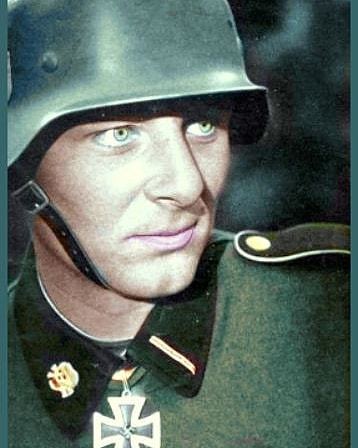
***Fritz Christen*** German War Hero - Christen served in the Waffen-SS with the infamous Totenkopf ("Deathshead") Division on the Eastern Front from the first days of the invasion of Russia during Operation Barbarossa by German forces. On the morning of September 24, 1941, Christen and his anti-tank battery were fighting Russian forces north of the Russian village of Lushno. During this fight, all of Christen's comrades had been killed or had left the field of battle while Christen remained. While exposed to artillery and small arms fire, Christen manned his 50mm cannon alone, holding on without supplies or provisions for the next two days. At night, he would sneak from his firing pit out to other gun sites and retrieve ammunition to replenish his supplies to continue his fight. When a counterattack by other Totenkopf troops recaptured Lushno, Christen was credited with having knocked out 13 Soviet tanks and single-handedly killing approximately 100 enemy soldiers. The SS men that relieved him were amazed that a single soldier could hold his position against hundreds of Soviet troops and a formidable armor presence. SS-Obergruppenführer Theodor Eicke, the commanding general of the division, awarded Christen with the Iron Cross, First Class and recommended him simultaneously for the Knight's Cross due to this magnificent act of bravery. Christen was called back to Germany where Adolf Hitler personally awarded him the Knight's Cross, making Christen the first enlisted man in his division to be given the honor. Upon receiving the decoration, Christen returned to his unit and continued to fight bravely throughout the rest of the war. In May of 1945, he was captured after the remainder of the severely diminished Totenkopf Division surrendered to American forces in Czechoslovakia. The Americans turned them over to the Russian Red Army. While in custody of the Russians, the Totenkopf men received especially harsh treatment due to their reputation as an organization that committed outrageous war crimes on Russian soil.Christen survived ten years of this brutal treatment and was released in 1955. He died quietly at his home in Bavaria in 1995. https://www.instagram.com/p/BoHBS20Cvvd/?utm_source=ig_tumblr_share&igshid=e6dw7lqsf544
24 notes
·
View notes
Photo
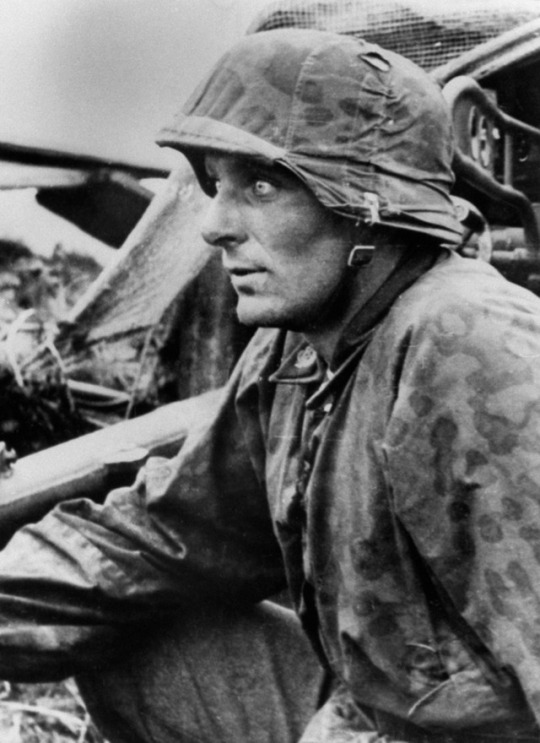

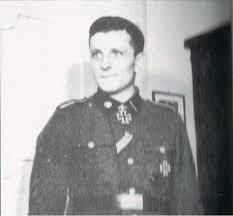
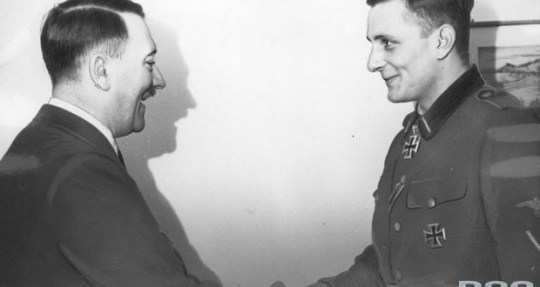
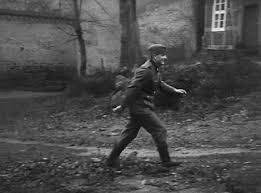
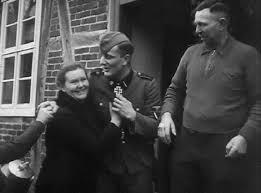
Fritz Christen (1921-1995) you need to survive to make the Medal meaningful. German War Hero - Christen served in the Waffen-SS with the Totenkopf Division on the Eastern Front from the first days of the invasion of Russia during Operation Barbarossa by German forces. On the morning of September 24, 1941, Christen and his anti-tank battery were fighting Russian forces north of the Russian village of Lushno. During this fight, all of Christen's comrades had been killed or had left the field of battle while Christen remained. While exposed to artillery and small arms fire, Christen manned his 50mm cannon alone, holding on without supplies or provisions for the next two days. At night, he would sneak from his firing pit out to other gun sites and retrieve ammunition to replenish his supplies to continue his fight. When a counterattack by other Totenkopf troops recaptured Lushno, Christen was credited with having knocked out 13 Soviet tanks and single-handedly killing approximately 100 enemy soldiers. The SS men that relieved him were amazed that a single soldier could hold his position against hundreds of Soviet troops and a formidable armor presence. SS-Obergruppenführer Theodor Eicke, the commanding general of the division, awarded Christen with the Iron Cross, First Class and recommended him simultaneously for the Knight's Cross due to this magnificent act of bravery. Christen was called back to Germany where Adolf Hitler personally awarded him the Knight's Cross, making Christen the first enlisted man in his division to be given the honor. Upon receiving the decoration, Christen returned to his unit and continued to fight bravely throughout the rest of the war. In May of 1945, he was captured after the remainder of the severely diminished Totenkopf Division surrendered to American forces in Czechoslovakia. The Americans turned them over to the Russian Red Army. While in custody of the Russians, the Totenkopf men received especially harsh treatment due to their reputation as an organization that committed outrageous war crimes on Russian soil. As a result, many of these men died while in a Soviet gulag. Christen survived ten years of this brutal treatment and was released to return home in 1955. He died quietly at his home in Bavaria in 1995. He and his wife Maria are buried in Neusorg, Bavaria, Germany.
2 notes
·
View notes
Text
Como jefe de la Gestapo, en 1933, Göring comenzó a
cerrar muchos de los campos más pequeños y no regulados, y
Himmler continuó el proceso en 1934. Mientras expandía el
control de la Gestapo a toda Alemania, Himmler buscó poner
todos los campos bajo la dirección de las SS. Respaldado por
Hitler, estableció una Inspección de Campos de
Concentración en el verano de 1934 y nombró a Theodor
Eicke, el brutal comandante de Dachau, para dirigirla. Eicke
era un viejo nazi fanáticamente leal a Himmler y era famoso
por la férrea disciplina y la implacable crueldad con la que
dirigía Dachau. Su tarea era poner orden en los campos, lo
que en la práctica significaba someterlos al firme control de
las SS. En lo sucesivo, solo las instalaciones organizadas por la
Inspección podían obtener la designación oficial como campo
de concentración: Konzentrationslager (KZ). Thomas Children.
0 notes
Text
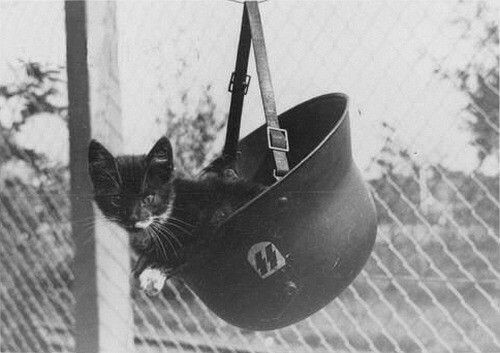
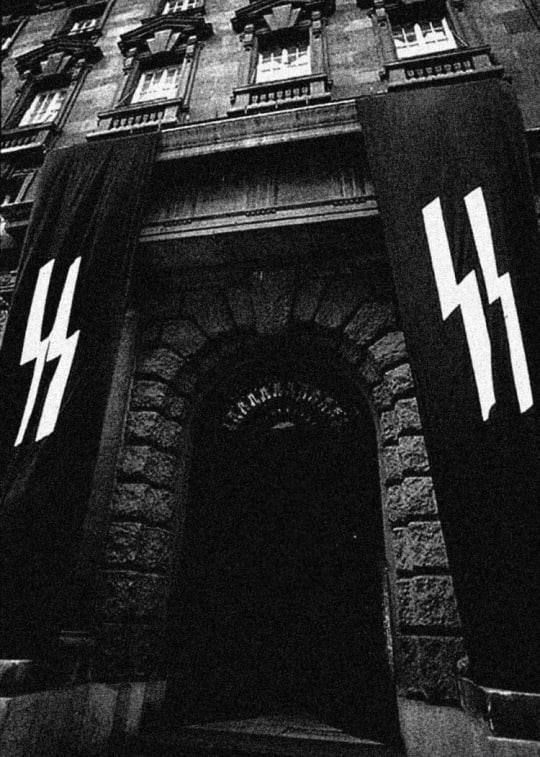

These are some facts and curiosities about the SS:
• the first SS formation appeared in 1923. In fact, it was in March of that year that the first military formation of the future SS Order was formed, the Strabswache, guard of the headquarters.
• Born to be Adolf Hitler's bodyguard, they swore an oath of loyalty and honor to him alone.
• To distinguish itself from other SA formations, the new formation chose the skull as its distinctive sign.
• On January 6, 1929, Hitler appointed Heinrich Himmler head of the SS, which at the time numbered only 280 men. With Hitler's approval, Himmler expanded the ranks of the SS and by the end of 1932 it already had 52,000 members. After just one year they had reached over 209,000 men.
• Their motto was "My honor is called loyalty".
• Rudolf Höss, the commander of Auschwitz, said in his autobiography: The Fuhrer commands, we obey, it was neither a phrase nor a slogan for us. It was a concept taken terribly seriously.
• By the time the Second World War began, the number of members rose to 250,000; the Waffen-SS was formed in December 1940 to fight alongside the Wehrmacht, often with wide autonomy of action.
• Only two institutions were not affected by the SS penetration: the army and the minister of propaganda.
• More than any other organization in Hitler's Reich, it embodied, propagandized and implemented the illusion of the dominant race: The Aryan Race.
• The minimum acceptable number of children for an SS member was four.
• No member of the organization can marry without the permission of the Reichsfuhrer SS (but it's your business, eh Himmler? What a nosy bespectacled hamster)
• A fundamental characteristic of the SS was the (mandatory) tattoo on the inside of the left arm which reported the blood type and the SS serial number
• On September 30, 1946, the judges of the Nuremberg trial court condemned the SS, declaring it a criminal organization. The judges underlined this ruling by declaring that «the SS was used for purposes that were criminal, which included: the persecution and extermination of the Jews, brutality and executions in concentration camps, excesses in the administration of the occupied territories, the administration of the of slave labor and the mistreatment and murder of prisoners of war. The ruling went on to state that the suspicion of war crimes would involve all persons who had been officially accepted as members of the SS… who became or remained members of the organization knowing that it was being used to commit acts declared criminal by Article 6 of the London War Crimes Statute."
•Members of particular note:
Heinrich Himmler: Reichsfuhrer SS
Reinhard Heydrich: Head of the SD
Rudolf Höss: the first commandant of Auschwitz
Josef Mengele: The Angel Of Death or '' Doctor Auschwitz''
Adolf Eichmann: Director of the department in charge of deportations and other “Jewish issues”
Heinrich Müller: ''Gestapo Müller'' the head of the Gestapo
Ernst Kalternbrunner: Heydrich's successor
Theodor Eicke: the first commandant of Dachau
Symbols of the SS:
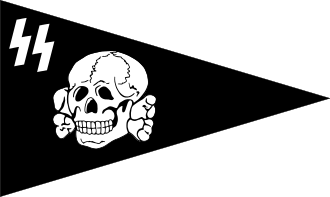
•The Totenkopf (from the German, skull), made up of a grinning skull and crossed bones, was undoubtedly the symbolic emblem of the SS and the terror associated with it. Referring to the tradition of the military corps of the Kingdom of Prussia first, and of numerous Freikorps later, the SS also adopted the death's head as their characteristic decoration
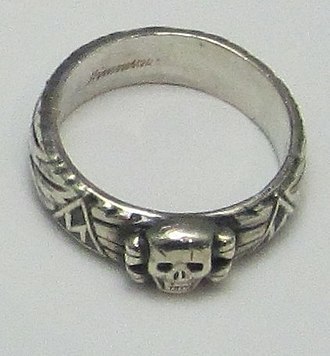
•Established by Himmler on 10 April 1934, the Totenkopfring der SS ("SS Skull Ring") was one of the most coveted decorations of the SS. It had the value of a very high recognition since it was an indication of the personal merits of the wearer, of his devotion to duty, of loyalty to Hitler and National Socialism.

•Heinrich Himmler, famously passionate about occultism, adopted many of these runes as a symbolic reference for the SS divisions. The symbol with the double Ss, created by placing two Sig - Runen (ᛋ) side by side, was created by the German graphic designer Walter Heck in 1933. Other runes, the Armanen Futharkh, were created by Guido von List and some were taken directly from the ancient Futhark. ( I will do another post about the SS runes)
Sources:
The SS: Wikipedia
SS: the black order of the reich by Enrico Cernigoi
Rudolf Höss: Commandant at Auschwitz
⚠️I DON'T SUPPORT NAZISM, FASCISM OR ZIONISM IN ANY WAY THIS IS AN EDUCATIONAL POST ⚠️
If you don't like it go with your life
#reichblr#ww2 germany#heinrich himmler#ww2 history#austrian painter#reinhard heydrich#rudolfhoss#the ss#holocaust#wwii
42 notes
·
View notes
Text
Still - Chapter 1: Homecoming
Fandom: Resident Evil Village
Characters: Alcina Dimitrescu, Karl Heisenberg
Relationship: Alcina Dimitrescu & Karl Heisenberg (Lovers)
Genre: Romance, Hurt & Comfort
Planned chapters: 8 + prolog and epilog
Warnings: Strong language, Descriptions of the Second World War (I do not glorify or support the ideology. The mention only serves my idea for the origin of Karl.)
Status: Work in progress (2/10)
Short Summary: As is well known, hatred and love are traveling on a dangerous thin line, but has it really always been that way between the fighting Lords? The sad answer is no. Alcina and Karl had a much deeper relationship than the brief glimpse Resident Evil Village suggests. This is their untold backstory. A story of a fiery love that is slowly torn apart by the parasite until the once strong feelings are only a faint memory in their dead hearts.
Ao3: https://archiveofourown.org/works/33511438/chapters/83314792
The hammock swayed in the gentle movements of the water, occasionally crashing into the neighbour's. The poor soul beside him snored loudly, totally ignored the hustle and bustle around him. Karl also wanted to sleep for the last hours of the long journey, but his comrades had other plans. The young soldiers hooted under the influence of the cheap alcohol and sang loud songs that had long ceased to amuse the minds of the dying heroes on the front lines: “Das kann doch einen Seemann nicht erschüttern! Keine Angst, keine Angst, Rosmarie!” The man turned away from his company, grumbling, and put an arm carefully under his head. The warship stank badly, and the rotting food in the next room didn't really make it any better. In addition, there was the smoke from the adulterated cigarettes, under which half the team was gradually threatening to suffocate if no one left the door open for a while. For the trained engineer, the war had long since lost its former beauty. What remained was the bitter aftertaste of blood and gunpowder on his rough tongue. The blond-haired man looked over at his sleeping comrade. Heinrich had fought with him on the Eastern Front for over six months. A brave soldier, but with extremely little brain and ingenuity.
Like so many survivors of the First World War. The brown-haired man was actually a trained bricklayer, but the seething hatred of the snooty winners of the first war had driven him back to the battleground. Full of hope and confidence in a quick liberation of the German Reich from the unlawful scourging of the arrogant allies. Overtired, Karl closed his eyes. After a brief hesitation, he himself had voluntarily joined the newly founded Schutzstaffel and, after studying engineering in Hamburg, had become an avid tinkerer of armoured vehicles. Despite his groundbreaking successes, the blond-haired man was finally sent to the front under the direction of General Theodor Eicke. After all, as an engineer, he knew better than anyone how to operate the new types of tanks. He even helped develop most of the prototypes himself. The initial joy had been replaced by the cruel reality within the first battle. At some point Karl had stopped counting how many of his friends had fallen in the ditch next to him. At first he tried hard to send letters to the bereaved families back home about the individual victims of the war, but at some point the number could no longer be put on paper and he gave it up in sheer resignation. The soldier groped blindly for his thin quilt. There were things he couldn't forget any more. Like the direct order to execute his then best friend Fritz Weber with a shot in the head. He tried to turn his back on the SS-Division Totenkopf and flee back to safer ground. Karl shuddered at the thought.
He had sincerely apologized to his friend before the execution, but at that moment there was no way for them to avert this cruel fate. Too many eyes had been fixed on them. Before he died, Fritz had given him an encouraging smile and made it clear that the engineer was not to be blamed for his death. That life could vanish so quickly from a person's eyes was a horrific experience of war. God must have been kind to him in the end. Karl was injured after being hit by metal pieces after a grenade attack and was allowed to spend Christmas in his home town of Lübeck after recovering in the hospital. His mother had begged him not to go back to the front. Together with a top-ranked officer of the Schutzstaffel they forged a plan to get him out of the country and transport him to Romania for a while. At least till the war would finally end. The shipping route was reasonably safe, even if attacks on the port city of Constance were to be expected. In the end it didn't really matter to Karl any more. He just wanted to leave and the foreign country seemed to be a welcome change. His mother had told him about a factory in the hands of his uncle in a very small village, who had probably no idea that the world was about to fall into another world war. Perfect. He had been officially transferred as a war hero and chosen officer to support the German troops in organizing the ally. After the first night in Constance, however, his trail would be lost in the often uninhabited mountains. The engineer suddenly startled at the loud noise of the foghorn.
He actually fell asleep after all. The man let himself slide off the hammock and looked in the direction of one of the eight portholes in the crew room. It was dawn, so the ship was not late. “You woke up in time, Officer Heisenberg. I thought I would have to wake you up soon.” The addressed person looked sceptically over to Heinrich, who was already packing his belongings into his worn backpack. He had a big grin on his face and handed his friend a cigarette. Heinrich explained with amusement: “A farewell present from home. I was told the tobacco should taste differently here in Romania.” Karl took the coffin nail gratefully and put it between his lips while he collected his own belongings. His fingers skilfully tied up the duffel bag and hoisted the load over his shoulder. Only then did the blond-haired man look for the lighter. He lit the cigarette and offered Heinrich the flame that was still burning. The soldier waved it off and replied calmly: “I don't want to smoke my last good tobacco on this sloppy ship. Let's go outside. I can't wait to breathe fresh air again and stretch my legs a little. I've heard that Constance is a beautiful city with beautiful women."
Heinrich winked at the still single officer with a smile. A good plan. Together they lined up behind the other soldiers and slowly pushed their way out of the overcrowded cabins. Many comrades would drive back to Lübeck the next morning as soon as the supplies would be left in the hand of the ally. Karl stepped out onto the deck and paused for a moment. The city lay before his eyes like a feverish dream come true. Incredibly beautiful and almost unreal. The water caressed the coast with hardly noticeable waves, only broke minimally on the rocks. Surprisingly, there was a lot of activity in the harbour at this time. Presumably they were eagerly awaited by the underserved allies. The engineer stepped down the wooden ship's ladder and looked around somewhat disoriented, looking in vain for Heinrich in the crowd. Disappeared. Great. The blond-haired man shrugged his shoulders and followed the other soldiers in the direction of the port control. A more than bored sergeant listlessly counted the arriving comrades and assigned them to the respective rooms in the local barracks. "Name and rank?", the man asked routinely. Karl took a drag on his cigarette and replied curtly: "Karl Heisenberg, officer of the SS-Division Totenkopf."
The soldier's eyes widened at these words. He got up suddenly and saluted properly. He called out loudly to the engineer: “Officer Heisenberg, it's an honour for me to finally get to know you personally. I have heard glorious stories from your operations on the Eastern Front and I cannot stress enough how important your presence is for the morale of the deployed division in Romania.” The soldier suppressed an all-too-obvious roll of his eyes. The lower echelons liked to sneak their way into the leading forces of the military and hoped to benefit from these relationships in the future. He reassured the man: “These formalities are not necessary. We're still at war, after all. Which room can I call my own for the night?” The addressed person broke out of his posture and nervously rummaged through his documents. Finally, he tapped an entry in a tattered book. He replied way too quickly: “You will of course be given a single room, Officer. No doubt. I'll have you escorted in a moment. Otto! Move here quickly, you day labourer!” A short soldier with tangled black hair snaked through the crowd and gave his superior a lanky salute. Karl raised an eyebrow sceptically. The man didn't look like he was doing his job in the company very reliably. The sergeant spoke coolly: “Please take Officer Heisenberg to room number eight immediately. From now on you are subordinate to him and take care of his physical well-being. I don't want to hear a bad word about our division. Understood?” Otto shrugged his shoulders slightly and mumbled softly:“ Yes, Sergeant Bennigsen.”
The men present said goodbye with the Nazi salute, in accordance with the regulations. The young soldier finally turned away from his supervisor and turned his attention to the newcomer. With a casual wave of his hand, he made it clear to the officer that he was following him. Together they left the mess at the port and roamed the empty streets of Constance. Here, too, scattered fields of rubble could be seen, but not comparable to the chaos that Karl had seen in Poland. The German Reich had left no stone unturned in their attack. Otto rubbed his itchy nose sore from too much cheap tobacco and asked inappropriately cheeky: “Excuse me, Officer Heisenberg, but what the hell brings such a big name like you to this country forsaken by God? There is definitely nothing to be gained here.” The addressed person pushed the now-extinguished cigarette from one corner of his mouth to the other and spat it out quickly. He replied calmly: “I'll go where General Eicke sends me.” Otto frowned and scratched his nose again. His yellowed moustache also revealed his favourite pastime. The soldier put his hands in his parka and replied with amusement: "Then you should go back to Lübeck as soon as possible and greet the General and, above all, the Führer from Private Grünberg, and say that they should send their best horses somewhere else. You're wasting your time here, Officer. Trust me."
Karl was startled at this unusually relaxed and admittedly bold way of talking. If he had been interested in his membership in the military, he would have had to reprimand the young man strongly, but this conversation at eye level came in very handy for him. He no longer paid much attention to his medals and awards. The engineer spoke slowly: “Let the upper echelons in Germany decide, Otto and please call me Karl from now on. I'm just a human like you, boy.” The soldier choked on his spit and stared at the blond-haired man with wide eyes. Then he began to grin happily. The black-haired replied mischievously: “I realized right away that you are obviously one of us. I can't stand all this stupid military behaviour, Karl. Before the war I was a simple carpenter, now I'm the girl for everything for the big baby Bennigsen.” The engineer couldn't help but smile. He added meanly: "That is what I call a successful career in the German Reich, comrade." Otto snorted, mock insulted, and began to laugh out loud. Before both of them could say anything else, they reached the barracks. There the private showed the officer his room and the associated sanitary facilities. It wasn't exactly luxurious, but it was probably better than the usual crew quarters. The young man leaned casually in the door frame, watched for a while as the older man put away his belongings. Finally he asked with a smile: “Are you in for some fun tonight? We have a nice club nearby where my favourite singer is performing today. English jazz, absolute sensation for the Wehrmacht. You have certainly never heard anything like it."
The addressed person thought for a moment. His need to recharge his batteries for tomorrow's trip to the mountains was noticeable, but at least as great was the curiosity about the unknown nightlife in Constance. He looked at the private and shrugged: “Why not? But I want to freshen up beforehand, otherwise the women will run away from me in droves.” Otto grinned at this statement. The black-haired man said goodbye with the promise to pick up the officer in less than an hour. Karl didn't relax until the door finally slammed shut. He enjoyed the loneliness after long journeys and the peace and quiet. The blond-haired man immediately went into the adjoining bathroom. He put a few pieces of wood under the tub and lit it, then let the water run in. It would certainly take a few minutes. The man used this time to write a short message to his mother at his desk. They had agreed on a specific sentence long before his trip to conceal the planned escape from the secret service. He added a few personal words and put the paper to one side. Otto would certainly do him a favour and pass it on. The engineer then took care of his neglected personal hygiene.
The officer had insisted on spending the voyage in the crew quarters of his comrades and not in one of the nicer cabins next to the captain. In several conversations he was able to successfully spread rumours in order to be able to plausibly explain his disappearance the next morning. Hours passed and, of course, Otto wasn't on time. The young man was good three hour late, but Karl had firmly reckoned with this. Anyone who did not take their service seriously and dared to speak to large military officers without permission would not constantly look at the clock. The black-haired man didn't even feel the need to apologize to him for his behaviour either. He greeted the officer visibly drunk: “That looks a lot better, Sir! Let's go, Karl. You will have a good time, I promise.” The engineer saved words for this statement. He just hoped that Otto didn't already have too much alcohol in his blood to no longer find his way to the club. However, the private seemed to get more stable with the rising alcohol level and had an impressive walk speed. Soon the lamps on an advertisement were glowing and dazzling in the dark. Karl couldn't make out the name of the club. He didn't have much time to read either. The black-haired man pushed him purposefully in the direction of the entrance and waved to the noble-looking doorman: “May I introduce you? This is Officer Karl Heisenberg from the SS-Division Totenkopf. He wants to have fun here today, so behave buddy."
Obviously the man at the door spoke German. He suddenly turned pale and let them in without a question. The blond-haired man first smelled the smoke of countless cigars, followed by sweet perfume and lovely wine. He entered the small ballroom. At each table there were four dark wooden chairs with red pillows, on the white tablecloths stood an equally white candle and a small vase with white daffodils. The dimmed light suggested that the announced show would begin soon. A waiter took care of them and escorted the gentlemen to a table that was still free. Karl couldn't even start to think about ordering anything. The staff seemed to have been warned by the doorman and immediately brought whiskey and a box of cigars. Certainly not expensive, but after half a year of fighting at the front, the engineer was no longer very picky. He helped himself and took a drag that calmed his trembling soul almost instantly. Otto poked the officer in the side with his elbow and nodded to his left. He was unusually red around the nose. Karl followed the gaze and immediately knew why the young man was so embarrassed. A beautiful woman was sitting at the counter. The white dress framed her graceful body and emphasized her feminine curves. The lady took a sip from a glass, then rose elegantly from the red bar stool. She sauntered slowly towards the stage, but stopped for a moment at the engineer's table.
The black-haired beauty smiled cautiously and spoke with a clear Eastern European accent: “I have already heard of your presence, Officer. I hope you will like my or better our small performance. It is certainly nothing special for someone like you, but may it help your war-tired soul to recover a little." The addressed person returned the smile and replied in a friendly manner:" I have no doubt about it, Lady-? ""You may just call me Miss D, Officer”, the singer anticipated and held out her delicate hand to him. The man immediately followed the request, breathed a little kiss on the skin. The blond-haired man whispered softly: "Then you can call me Karl, Miss D." The black-haired woman smiled amused, nodded slightly and left the table to go to her band. She sat down on the stool in front of the microphone. The ballroom immediately fell silent. The woman let her gaze wander through the crowd and spoke to her audience in a melodic voice: “Ladies and gentlemen. Today we want to forget the atrocities of the world for a moment together and indulge in healing music. I and the Pallboys have put together an exciting program for you that you are sure to love. Now lean back. The first song is called 'Put' Em In A Box, Tie 'Em With A Ribbon'. Enjoy."
The lights in the hall slowly went out, only the spotlights remained on the stage and drew attention to the band. The musicians began to play after a short count from the drummer. Before the singer began her own marvel, she threw Karl a deadly sweet kiss on the hand and then turned back to the crowd. Otto hadn't lied. Her voice was extraordinary. Even if the engineer didn't have a perfect knowledge of the English language, the words were not alien to him and he could imagine that the woman must have chosen this song on purpose. She seemed to be a lady who knew about her effect on men and played with it. The completely fascinated soldiers around him were proof enough of his theory. He too couldn't avoid feeling her engaging aura. The black-haired woman was like a magnet and every attempt to look away from her failed with every word she sang next. Karl felt his heart beat faster in his chest. He leaned over to Otto and whispered hoarsely: "And you rascal dare to say there is nothing to get here." The private laughed a little, then shrugged helplessly. He replied just as quietly: "I just don't like sharing, Karl."
The officer shook his head slightly and focused again on the unique appearance. All the men were literally glued to the beautiful woman's lips. Miss D just looked through most of the soldiers, gave them only a fraction of her precious time and at some point concentrated on the still unknown engineer. Apparently he had piqued her interest. The blond-haired man took a sip of the whiskey and made a slight face. Much too strong. After a short solo by the band, the last part of the song began. Finally the instruments fell silent, leaving the singer in the spotlight for another unique moment. The play ended and for a moment the crowd was enchanted. Nobody dared to clap. Karl felt that someone had to start, so he started to applaud. Otto blinked dreamily and rose immediately, cheering applause. The other soldiers followed suit, some whistling loudly. Miss D smiled mischievously and visibly let her charm play. The officer's and singer's gaze met again. That interesting evening was probably far from over.
#Resident Evil#Resident Evil 8#Resident Evil VIII#Resident Evil Village#Karl Heisenberg#Alcina Dimitrescu#Donna Beneviento#Angie#Salvatore Moreau#Mother Miranda#Romance#Hurt & Comfort#Alcina x Karl#Karl Heisenberg x Alcina Dimitrescu
0 notes
Text
Events 3.20
673 – Emperor Tenmu of Japan assumes the Chrysanthemum Throne at the Palace of Kiyomihara in Asuka.
1206 – Michael IV Autoreianos is appointed Ecumenical Patriarch of Constantinople.
1600 – The Linköping Bloodbath takes place on Maundy Thursday in Linköping, Sweden: five Swedish noblemen are publicly beheaded in the aftermath of the War against Sigismund (1598–1599).
1602 – The Dutch East India Company is established.
1616 – Sir Walter Raleigh is freed from the Tower of London after 13 years of imprisonment.
1760 – The Great Boston Fire of 1760 destroys 349 buildings.
1815 – After escaping from Elba, Napoleon enters Paris with a regular army of 140,000 and a volunteer force of around 200,000, beginning his "Hundred Days" rule.
1848 – German revolutions of 1848–49: King Ludwig I of Bavaria abdicates.
1852 – Harriet Beecher Stowe's Uncle Tom's Cabin is published.
1854 – The Republican Party of the United States is organized in Ripon, Wisconsin, US.
1861 – An earthquake destroys Mendoza, Argentina.
1883 – The Paris Convention for the Protection of Industrial Property is signed.
1888 – The premiere of the very first Romani language operetta is staged in Moscow, Russia.
1890 – Chancellor of the German Empire Otto von Bismarck is dismissed by Emperor Wilhelm II.
1896 – With the approval of Emperor Guangxu, the Qing dynasty post office is opened, marking the beginning of a postal service in China.
1913 – Sung Chiao-jen, a founder of the Chinese Nationalist Party, is wounded in an assassination attempt and dies 2 days later.
1916 – Albert Einstein publishes his general theory of relativity.[citation needed]
1921 – The Upper Silesia plebiscite was a plebiscite mandated by the Versailles Treaty to determine a section of the border between Weimar Germany and Poland.
1922 – The USS Langley is commissioned as the first United States Navy aircraft carrier.
1923 – The Arts Club of Chicago hosts the opening of Pablo Picasso's first United States showing, entitled Original Drawings by Pablo Picasso, becoming an early proponent of modern art in the United States.
1926 – Chiang Kai-shek initiates a purge of communist elements within the National Revolutionary Army in Guangzhou.
1933 – Reichsführer-SS Heinrich Himmler ordered the creation of Dachau concentration camp as Chief of Police of Munich and appointed Theodor Eicke as the camp commandant.
1942 – World War II: General Douglas MacArthur, at Terowie, South Australia, makes his famous speech regarding the fall of the Philippines, in which he says: "I came out of Bataan and I shall return".
1948 – With a Musicians Union ban lifted, the first telecasts of classical music in the United States, under Eugene Ormandy and Arturo Toscanini, are given on CBS and NBC.
1951 – Fujiyoshida, a city located in Yamanashi Prefecture, Japan, in the center of the Japanese main island of Honshū is founded.
1952 – The US Senate ratifies the Security Treaty Between the United States and Japan.
1956 – Tunisia gains independence from France.
1964 – The precursor of the European Space Agency, ESRO (European Space Research Organisation) is established per an agreement signed on June 14, 1962.
1969 – A United Arab airlines (now Egyptair) Ilyushin Il-18 crashes at Aswan international Airport, killing 100 people.
1972 – The Troubles: The first Provisional IRA car bombing in Belfast kills seven people and injures 148 others in Northern Ireland.
1985 – Libby Riddles becomes the first woman to win the 1,135-mile Iditarod Trail Sled Dog Race.
1985 – Canadian paraplegic athlete and humanitarian Rick Hansen begins his circumnavigation of the globe in a wheelchair in the name of spinal cord injury medical research.
1987 – The Food and Drug Administration approves the anti-AIDS drug, AZT.
1988 – Eritrean War of Independence: Having defeated the Nadew Command, the Eritrean People's Liberation Front enters the town of Afabet, victoriously concluding the Battle of Afabet.
1990 – Ferdinand Marcos's widow, Imelda Marcos, goes on trial for bribery, embezzlement, and racketeering.
1993 – The Troubles: A Provisional IRA bomb kills two children in Warrington, England. It leads to mass protests in both Britain and Ireland.
1995 – The Japanese cult Aum Shinrikyo carries out a sarin gas attack on the Tokyo subway, killing 13 and wounding over 6,200 people.
1999 – Legoland California, the first Legoland outside of Europe, opens in Carlsbad, California, US.
2000 – Jamil Abdullah Al-Amin, a former Black Panther once known as H. Rap Brown, is captured after murdering Georgia sheriff's deputy Ricky Kinchen and critically wounding Deputy Aldranon English.
2003 – Iraq War: The United States, the United Kingdom, Australia, and Poland begin an invasion of Iraq.
2006 – Over 150 Chadian soldiers are killed in eastern Chad by members of the rebel UFDC. The rebel movement sought to overthrow Chadian president Idriss Déby.
2010 – Eyjafjallajökull in Iceland begins eruptions that would last for three months, heavily disrupting air travel in Europe.
2012 – At least 52 people are killed and more than 250 injured in a wave of terror attacks across ten cities in Iraq.
2014 – Four suspected Taliban members attack the Kabul Serena Hotel, killing at least nine people.
2015 – A Solar eclipse, equinox, and a supermoon all occur on the same day.
2015 – Syrian civil war: The Siege of Kobanî is broken by the People's Protection Units (YPG) and Free Syrian Army (FSA), marking a turning point in the Rojava–Islamist conflict.
0 notes
Photo

Theodor Eicke (17 October 1892 – 26 February 1943) was a German SS functionary during the Nazi era. He was one of the key figures in the development of Nazi concentration camps during the Holocaust.
Eicke served as the second commandant of the Dachau concentration camp from June 1933 to July 1934, and together with his adjutant Michael Lippert, was one of the executioners of SA Chief Ernst Röhm during the Night of the Long Knives purge.[1] In 1939, Eicke became commander of the SS Division Totenkopf of the Waffen-SS, leading the division during the Second World War on the Western and Eastern fronts, and continuing to expand and develop the concentration camp system.
Eicke was killed on 26 February 1943, when his plane was shot down during the Third Battle of Kharkov.
https://en.wikipedia.org/wiki/Theodor_Eicke
1 note
·
View note
Photo

Theodor Eicke commanding 3rd ϟϟ Panzer Division ‘Totenkopf’ (Death’s Head Division) during Operation Barbarossa. September, 1941. [Bundesarchiv / Bild 101lll-Wiegand-116-03] #war #history #ww2 #ww2
12 notes
·
View notes
Text

Sejarah Panzer Division Totenkopf, Pasukan Tank Berani Mati Nazi Jerman Yang Bertempur hingga Titik Darah Penghabisan
Intisari-Online.com - Salah satu Divisi yang menjadi andalan Waffen SS adalah SS-Panzer Division Totenkopf atau juga dikenal sebagai 3. SS Panzergrenadier-Division Totenkopf serta 3.SS Panzer-Division Totenkopf.
Divisi panser yang memakai lambang tengkorak (Totenkopf) ini dibentuk pada bulan Oktober 1939 dan para personil pasukannya mayoritas berasal dari penjaga kamp konsentrasi.
Satuan yang kemudian bergabung dengan Totenkopf adalah 1st, 2nd, 3rd, Standarten dari unit SS-Totenkopfverbande.
Pasukan Division Totenkopf yang dalam misi tempurnya bertarung secara fanatik menggunakan persenjataan rampasan dari Chekoslovakia dan dikomandani oleh SS-Obergruppenfuhrer Theodor Eicke.
Seperti divisi Waffen SS lainnya, Totenkopf terlibat pertempuran di berbagai medan dan para pasukannya dikenal sebagai prajurit brutal serta kejam.
Salah satu kekejaman Totenkopf adalah aksi pembantaian terhadap 99 personil tentara Inggris dari Royal Norfolk Regiment yang sudah menyatakan menyerah.
Pembantaian berlangsung di Le Paradis, Perancis, tempat markas 4th Kompanie I Abteilung yang saat itu dikomandani oleh SS-Oberstrumfuhrer Fritz Knochlein.
Sebagai pasukan tempur yang memakai lambang tengkorak dan itu berarti berani berperang sampai mati, prajurit Totenkopf membuktikan prinsip itu ketika menyerbu Rusia (Operation Barbarossa).
Pada pertempuran yang berlangsung di kawasan Demjank Pocket pasukan (April 1941) pasukan Totenkopf yang terkepung mengalami kerugian besar karena lebih dari 50% prajuritnya tewas.
Dengan pasukan yang tersisa, sekitar 120 orang, komandan Totenkopf SS-Hauptstrumfuhrer Erwin Mejerdress membangun kekuatan baru dan berhasil memecah kepungan musuh.
Pasukan Totenkopf yang terkepung pun berhasil bergabung dengan unit lainnya untuk selanjutnya melancarkan serangan balik.
Namun, pertempuran di Demjank Pocket yang menjadi bukti bagi kehebatan dan sekaligus kefanatikan pasukan Totenkopf harus dibayar bayar mengingat 80% pasukannya gugur.
Sisa pasukan Totenkopf kemudian ditarik ke medan perang Perancis (1942) dan mendapat suplai tank-tank baru serta nama divisi baru, 3.SS-Panzergrenadier-Division Totenkopf.
Tugas divisi panser Totenkopf berlangsung hingga tahun 1943 dan setelah itu Totenkopf ditugaskan lagi ke front Eropa Timur dan menjadi bagian kekuatan Army Group South di bawah pimpinan Erich von Manstein.
Divisi Totenkopf kemudian bertempur di Rusia khususnya dalam perang tank di kawasan Kharkov dan Kursk. Dalam pertempuran sengit di Kharkov, Theodore Eicke, gugur akibat terhantam reruntuhan pesawat pengintai. Posisi Eicke kemudian digantikan oleh Hermann Pries.
Tugas tempur Totenkopf di Eropa Timur ternyata merupakan tugas yang terakhir karena ketika pasukan Rusia berhasil melancarkan serangan balik dan memukul mundur pasukan Nazi Jerman hingga ke tanah air Jerman, divisi panser Totenkopf akhirnya berhasil dihancurkan oleh pasukan tank Rusia.
Sisa-sisa para personil Totenkopf kemudian menjadi tawanan Rusia dan dijadikan pekerja paksa di Gulag. Banyak di antaranya yang tewas dan hanya segelintir yang bisa kembali lagi ke Jerman pasca PD II.
Sumber: https://intisari.grid.id/amp/0397048/panzer-division-totenkopf-pasukan-tank-berani-mati-nazi-jerman-yang-bertempur-hingga-titik-darah-penghabisan?page=all
0 notes